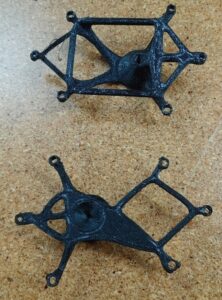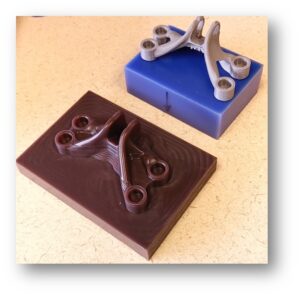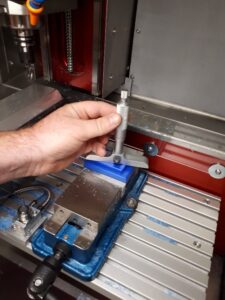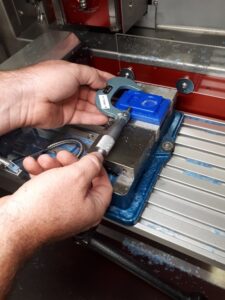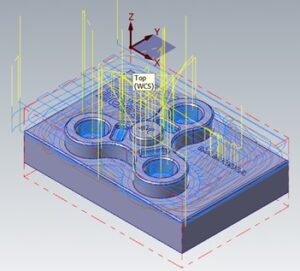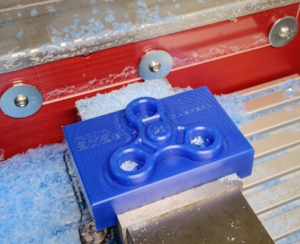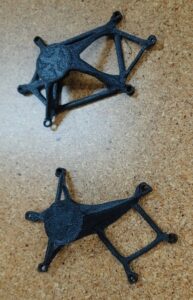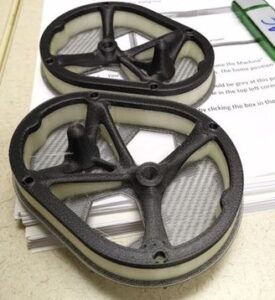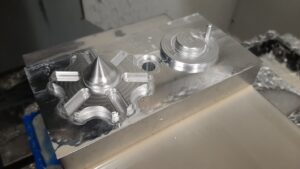Student Experience
Overview
This two-year college diploma program is designed to prepare the graduates with a comprehensive background in advanced manufacturing including additive and subtractive manufacturing methods (3D printing, 3D scanning, manual and CNC (Computer Numerical Control) machining, prototyping, jigs and fixture design and 3D modeling and drafting with GD&T).
Students receive detailed courses in CAD (Computer-Aided Design), manufacturing technics, Computer Numerical Control (CNC) programming, mathematics, material science, metallurgy lab, soldering, PLC (Programmable Logic Controller), 3D printing and Generative Design, Quality Assurance, CNC machining (Mill and Turning/lathe) and a myriad of other industry relevant topics.
Applications of this field of study are relevant for such industries as aircraft and aerospace, Research and Development (R&D), medical device production, automotive parts, food and agriculture, and many other industrial sectors in advanced manufacturing. This comprehensive education gives enrollees a solid foundation on which to build future success in Industry.
This two-year college diploma has an exciting and diverse job market in Canada where students gain more valuable industrial experiences allowing them to expand on career pathways and liaise with Industry to build job portfolios.
Student Projects
In this program, students have many chances to be involved in different projects including but not limited to CNC conversational programming, 3D scanning, Quality Control with CMM (Coordinate Measurement Machine) and Optical Comparator Machines, manufacturing of assemblies such as a gearbox (A-Z processes needed including CNC programming, machining to final inspection reports) and many other hands-on course projects supporting advanced manufacturing skills.
Students complete machining procedures/tool paths on CNC simulators without any CNC programming software and apply what they learned about conversational programming.
In the 3D printing and Additive Manufacturing course, the students have a chance to learn about Generative Design based on AI (Artificial Intelligence) and explore new ways of manufacturing parts on cloud-based software. They can 3D print or CNC machine final generated parts produced and explored by AI on defined design conditions. They have options to do 3D scanning and/or do inspections on the final products manufactured by 3D printing or CNC machining.
Students do supervised activities on CNC machines parallel to their CNC classes to be more comfortable with using MDI commands and do proper setup while they can design their own 3D model, verify the CNC programming, and finalize it on CNC machines to manufacture their own designed parts.
Project completion certificates including Mastercam/Fusion 360 CNC programming, CNC machining, 3D scanning, 3D printing, and inspection techniques are available for those students who would like to do more and experiment with what they learned in some courses on top of the actual class time.
On a visit to Central Wire Industries in Perth, Ontario, students from the Manufacturing Engineering Technician program handed over several finished, custom designed and manufactured Wire Tensioner devices.
Student Testimonials
Check out Christopher’s experience.
Yakin shares his experience in the Manufacturing Engineering Technician program.
 Career Opportunities
Career Opportunities
Graduates of this two-year advanced diploma will have access to employment in Engineering Design positions ( CAD ), Quality assurance departments, Product planning and Process Engineering specialists, and Computer programming as it relates to Numerical controlled robotic type equipment.
Employer Testimonials
“Over the last 16 years, Billet Precision Corporation has hired dozens of Algonquin Graduates now in key positions paying well over $65k. Each year we hire from the graduating classes and find it very beneficial to sustain our company growth”
Joe Shuster
President of Billet Precision Corporation
“The National Research Council Apprenticeship Program was developed to attract, train, and retain highly skilled Individuals who will carry on NRC-DFS’ tradition of technical excellence, in conventional as well as new technologies. Algonquin College has been a key source for top-quality employees coming into the National Research Council with a solid foundation of technical training – ready to tackle our Apprenticeship Program head-on!”
Allan Horner
Supervisor
National Research Council Canada
